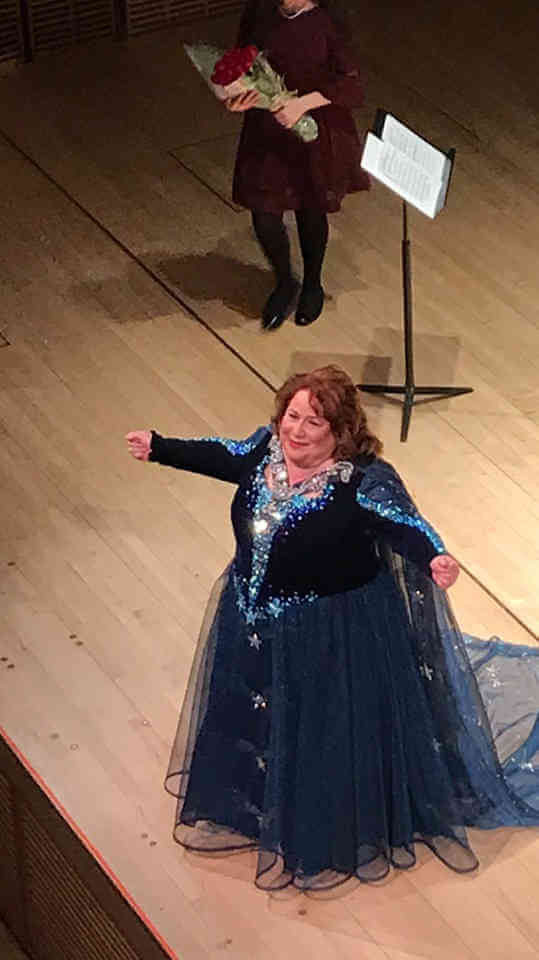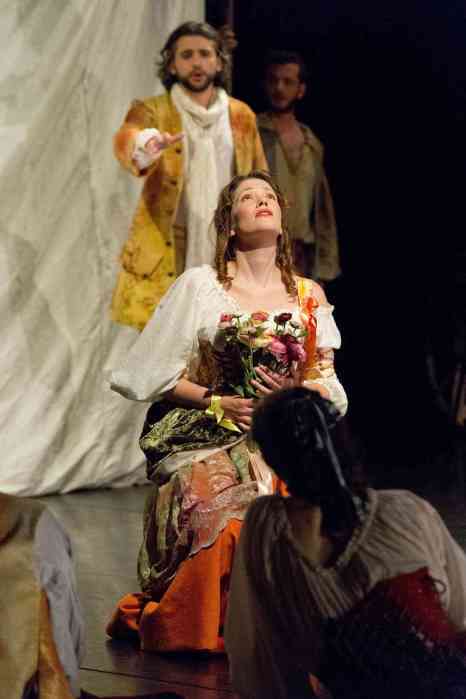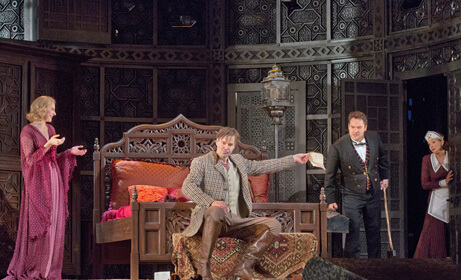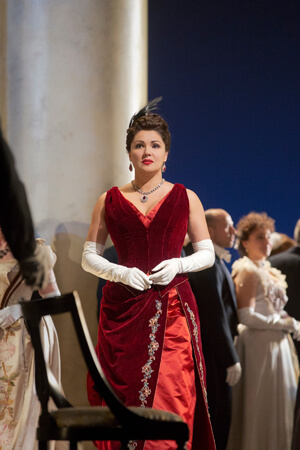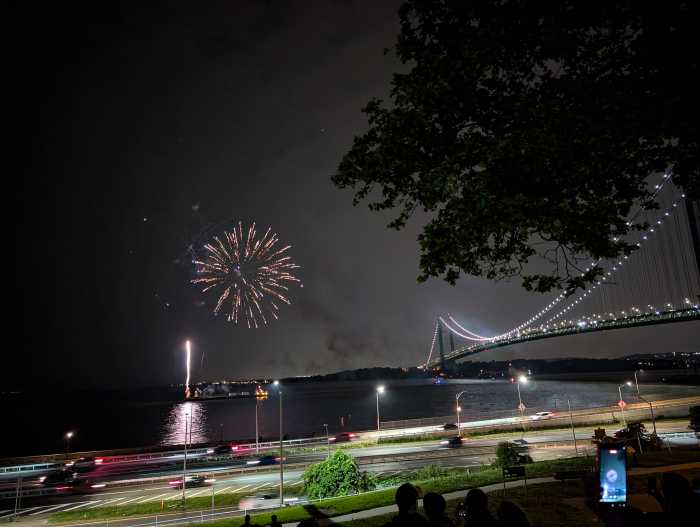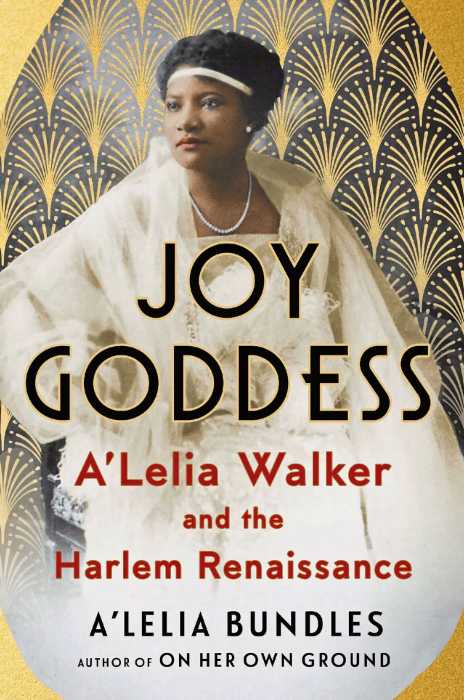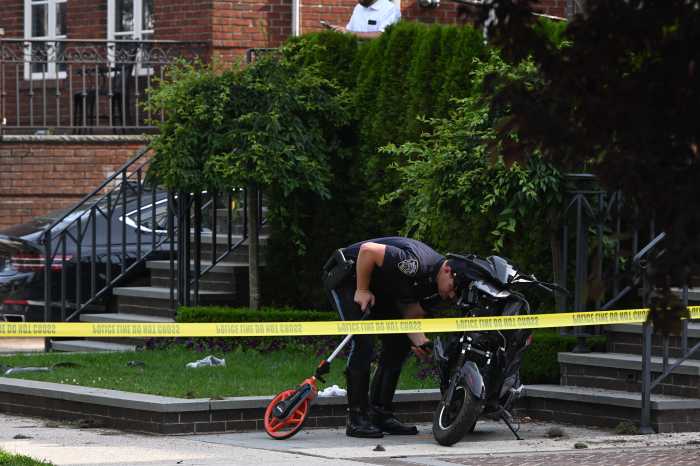More than 35 years ago, cult diva and New York treasure Aprile Millo established herself as a throwback Italian-style prima donna of the old school. She evoked not only the vocal style but the presentational theatrics of historical sopranos. Vocal and performance anxiety issues have curtailed Millo’s career to the extent that every appearance is a comeback – no, a return!
The recital presented by the New York City Opera at Zankel Hall on January 30 was a notable event. It revealed not only how much voice Millo has intact at age 60, but also the imaginative and versatile musician behind the diva façade. What was also evident was the old-fashioned diva excitement she stirred in her audience. There were cheers of “We love you!” and “You’re the best, Aprile!” with saucy banter going back and forth between the diva and her fans. Not since Montserrat Caballé recitals back in the last century did one hear such screaming and chanting — Renée Fleming recitals are much tamer. Millo’s sass and her self-mocking jokes summoned memories of Bette Midler in the baths and beyond. The prima donna wore two elaborately brocaded and sequined gowns that belonged in a grand opera. At the final curtain call, Millo could have opened a florist shop with all the bouquets she received.
I will not pretend that this is the same voice we heard in the 1980s as Aida or the “Trovatore” Leonora. The opening group of Italian songs by Tosti, Donizetti, and Donaudy suffered from curt phrasing as if the muscles needed for breath support weren’t warmed up. But warm up she did and the lush timbre is still intact though in a slightly lower range. Most of the keys put Millo in central mezzo territory. The top is still there up to a solid high B, though in need of careful preparation and not as flexible or free as of yore. Pressure can produce a beat in the upper middle register.
Frank Bridge’s song “Love Went a-Riding” brought out a sweeping breadth of phrasing and generous tone. It was the set of traditional Irish songs (“The Rose of Tralee,” “The Kerry Dance,” “Bendeemer Stream,” and “Danny Boy”) accompanied by harpist Merynda Adams that put the audience totally under Millo’s spell. She dug deep into her heart — her father sang these songs and her family performed them together often — while launching pure spinning tones into the hall. This was soul-singing in a very different vein from Italian opera. Millo combined the spiritual and the dramatic with her half-sung, half-declaimed final death scene “Grazie, sorelle” from Refice’s “Cecilia” — a tribute to Claudia Muzio, the role’s creator.
After intermission, the group of three Rachmaninoff songs proved her best showing of the night after the Irish songs. They were performed with fervent passion and surprising textual projection in a language that is new to her. “O ma lyre immortelle” from Gounod’s “Sapho” and the Aida/ Amonasro duet “Ciel! Mio Padre!” from Act III of “Aida” (with bass-baritone Kevin Short bellowing out choppy phrases while Millo demonstrated how the music should go) showed some encroaching vocal fatigue but also careful phrasing and dramatic depth. The final encore of traditional Italian canzone had the audience singing along to “Core N’Grato” and “O Sole Mio.”
The excellent voices of the impromptu chorus was not all that surprising — dozens of New York based opera and concert singers and vocal students were in the hall to experience the Millo magic live and in person. Credit should be given to pianist Inseon Lee who discreetly catered to the diva’s every need while providing alert musical support throughout.
What gave the evening its special glow was the deep love and respect that Millo lavished on her music and the generosity with which she shared it with her public. Each song by different composers in different languages and styles revealed a new Aprile Millo. Behind the diva posturing, there is a passionate and penetrating musical artist, and also a born entertainer. This could and should be an annual event. The audience is there if the star is willing.
The Met revived some challenging and dark operas in the darkest days of winter — the double bill of Tchaikovsky’s “Iolanta” and Bartók’s “Bluebeard’s Castle” as well as Debussy’s “Pelléas et Mélisande.” Both Isabel Leonard and Paul Appleby made their role debuts as the titular lovers in Debussy’s sole opera with Met music director Yannick Nézet-Séguin presiding in the pit. Jonathan Miller’s production remains intriguing as we never leave the stuffy rooms and gardens of the crumbling fin de siècle mansion. However, I miss the presence of nature depicted in Debussy’s score — it all looks a bit arid.
The January 25 performance was dominated by the Golaud of bass-baritone Kyle Ketelsen. Golaud is the one character who has easily relatable emotions and motivations and acts upon them. The lean and vulpine Ketelsen projected a youthful virility that made one question Mélisande’s infuriating diffidence toward him. His bass-baritone was focused and keenly responsive to text — he fully inhabited the character. Despite the fact that Golaud is the aggressor who instigates the final tragedy, Ketelsen broke my heart with his deep shame, frustration, and heartbreak in the final scene.
Leonard sang Mélisande’s music beautifully with a cool high mezzo that evoked moonlight reflected off a shiny dark surface. Her conventional glamor makeup, self-possessed air, and erect posture did not evoke the evasive, passive-aggressive Mélisande but some kind of calculating mystery woman with a hidden agenda. Mélisande’s half-conscious death scene, which stripped Leonard of her lipstick and rouge while she was limply propped up in bed, showed what she can and will do with this role.
Appleby’s tenor Pelléas was restored to vocal health but was too much the wholesome American graduate student in demeanor and appearance. Contralto Marie-Nicole Lemieux made an impressive debut as Geneviève aided by a warmly sympathetic timbre and native francophone diction. Her reading of the letter imparted deep empathy and investment in Geneviève’s relationships with the characters onstage and those referred to in the text.
Ferruccio Furlanetto’s craggy bass evoked Arkel’s age and authority but sounded a little too Filippo II in “Don Carlo” for my tastes. Treble A. Jesse Schopflocher made a frail, almost too delicate Yniold. This worked beautifully with Miller’s brilliant concept that Yniold is also a damaged victim in the drama, traumatized in Act III. In the later acts, Yniold continues spying on his uncle and stepmother and suffers from nightmares.
Debussy’s sole opera is a specialty of Nézet-Séguin’s – as with “Traviata” he summoned beautiful playing from the Metropolitan Opera Orchestra. The Met Orchestra in the right hands has been reestablishing itself as one of the world’s great orchestras. The orchestral textures were transparent and clearly articulated but I felt there was a lack of mystery and weight behind the notes – it sounded too lucid and literal.
Mariusz Trelinski’s 2015 production of Tchaikovsky’s “Iolanta” and Bartók’s “Bluebeard’s Castle” attempts to connect both operas by setting them in the same dark forest with common underlying themes of women being imprisoned by controlling men. The women yearn for the light but the men push them back into the shadows. This concept doesn’t work for the essentially romantic and positive “Iolanta,” which is a parable about the redemptive power of love and self-knowledge and ends happily with the blind heroine able to see through the power of love. Trelinski sends up the radiant finale as kitsch with the whole company lined up like the finale of an operetta. The scrim remains down throughout the show, keeping everyone in the shadows even after Iolanta regains her sight.
This revival of “Iolanta” was improved by stronger casting in the highest female and lowest male voices. Sonya Yoncheva, a gifted and beautiful soprano who is pushing herself too far too fast, shone in a role that suits her beautifully. Yoncheva seemed more girlish and innocent than Anna Netrebko and the voice has more fragility built in. Iolanta is the perfect size role for Yoncheva’s dark-colored full lyric soprano voice. The dark undertones in her timbre evoke Iolanta’s loneliness and melancholy while the silvery overtone suggests innocence and yearning. Yes, a few high phrases quivered with too much vibrato but this was lovely, sensitive singing with the silvery glow restored to the tone. Her acting was full of sensitive and specific detail.
In 2015, the pivotal bass role of King René was woefully undercast with the understudy taking over the role. Vitalij Kowaljow’s rich enveloping bass turned René’s solo aria into a showstopper with only a few shallow low notes to his demerit. Matthew Polenzani as Iolanta’s savior Vaudemont turned in a sensitively sung portrayal with convincing Russian and cultivated tone. He only lacked the dash that Piotr Beczala brought to the role. Alexey Markov, returning as Robert, had plenty of dash sounding like a Russian Ettore Bastianini in his swaggering aria extolling his beloved Matilda. Elchin Azizov sounded more focused and rich-toned as the Moorish physician Ibn-Hakia than he did in 2015. Veteran contralto Larissa Diadkova and bass newcomer Harold Wilson brought rich voices and authority to their roles as faithful servants.
New Hungarian maestro Henrik Nánási conducted a tight, somewhat airless reading of Tchaikovsky’s score that lacked lyric impulse and expansion.
Nánási’s reading of “Bluebeard’s Castle” was also full of accurate detail but lacked power. In 2015, the two leads were Nadja Michael and Mikhail Petrenko, who made up in stage charisma for unimpressive vocalism. No apologies for the current pair: Gerald Finley’s vibrant bass-baritone is as magnetic as his stage presence as Bluebeard. Angela Denoke provided not only kinetic stage presence but a consistent and rangy soprano to Judith’s tricky music. Her well-traveled soprano is not the warmest or most beautiful sound these days but she knows what she is doing vocally and dramatically. Denoke’s body and voice precisely respond to the music and action. Finley I found rather too overtly menacing in his stage business — constantly grabbing and manipulating Judith with evident violent intention. Petrenko was a more enigmatic and subtly sinister presence.
Treliński’s darkly dystopic universe works better for the Bartók than it does for Tchaikovsky’s fairy tale parable. The final seventh door blew me away even after several prior viewings. Though suffering from some faulty sound cues in the prologue, this “Bluebeard” production remains one of the most provocative in the Met repertory.
In early January, New York City Opera presented the world premiere of Ted Rosenthal’s jazz opera “Dear Erich” with a libretto by the composer and his wife Lesley Rosenthal. It seems appropriate that the work should be a family affair since the story is based on the discovery of a cache of correspondence between Ted Rosenthal’s late German-Jewish refugee father Erich Rosenthal and his grandmother Herta who had stayed behind in Nazi Germany. Eventually, Herta’s letters from Germany detailing her frustrated attempts to emigrate to the US and the encroaching Nazi threat became fewer and fewer and one day stopped. Only many years after the war did Erich learn of Herta’s and their cousins’ fate in the gas chambers, leaving him with profound survivor’s guilt and depression.
This is inherently powerful and moving dramatic material that needed more seasoned operatic hands to shape the music and text. The Rosenthals’ thrown-together libretto is full of clumsy rhyming couplets that are jejune and predictable. The finale where the dying old Erich, after receiving his mother’s last letter which was found in the ruins of a synagogue in Germany, can die happy after connecting emotionally with his son was corny and forced. Yet, I was moved anyway — the story gets to you despite the clumsy treatment.
German-born transplant Kurt Weill and the American Leonard Bernstein had schooling in classical composition as well as jazz. They wrote jazz operas with dramatic subjects that could change musical styles and tone to suit the dramatic situation. Rosenthal isn’t that versatile and has the elderly Herta and her husband lamenting the Nazi threat in Germany to a bebop beat like they were jiving in a 1940s Harlem nightclub. The 20th century jazz score did suit the American scenes where young Erich discovers love and the nightlife in Chicago with his American girlfriend (later wife) Lili. Ted Rosenthal is a fantastic jazz composer with a gift for melody and style who could be composing musical theater with the right collaborators.
City Opera provided a tight, shipshape production directed with forward moving momentum and little fuss by Mikhaela Mahony on the intimate stage of the National Yiddish Theatre Folksbiene at the Museum of Jewish Heritage downtown. Adam Glaser led an excellently prepared and versatile jazz ensemble of a dozen or so players. A cast of talented New York singers included musical theater performers (Rachel Zatcoff as Lili) and opera singers (baritones Brian James Myer and Peter Kendall Clark as the young and old Erich respectively). Some cast members like Jessica Tyler Wright (Herta) and Glenn Seven Allen (as Erich’s son Freddy, the dramatic counterpart to Ted Rosenthal) are crossover performers who do both musical theater and opera. They never hit a wrong note even when the tone of the words and music were off.


